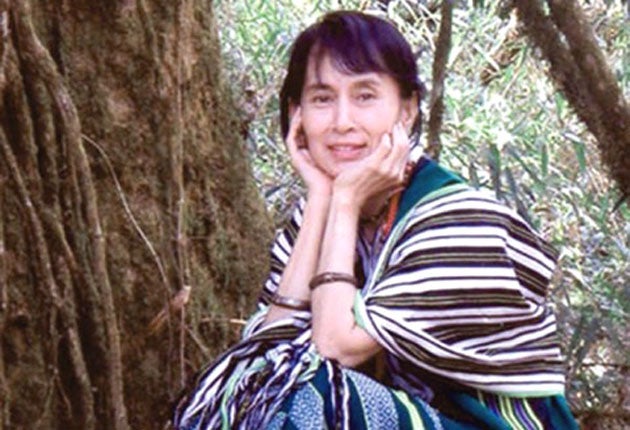Suu-Kyi backs US move to open talks with junta
Hillary Clinton's bid to encourage reform in Burma by bringing military rulers to table wins support from pro-democracy leader

Your support helps us to tell the story
From reproductive rights to climate change to Big Tech, The Independent is on the ground when the story is developing. Whether it's investigating the financials of Elon Musk's pro-Trump PAC or producing our latest documentary, 'The A Word', which shines a light on the American women fighting for reproductive rights, we know how important it is to parse out the facts from the messaging.
At such a critical moment in US history, we need reporters on the ground. Your donation allows us to keep sending journalists to speak to both sides of the story.
The Independent is trusted by Americans across the entire political spectrum. And unlike many other quality news outlets, we choose not to lock Americans out of our reporting and analysis with paywalls. We believe quality journalism should be available to everyone, paid for by those who can afford it.
Your support makes all the difference.The US is set to engage directly with Burma's military rulers in an effort to push for democratic reforms while maintaining sanctions – a move that has the support of the imprisoned opposition leader Aung San Suu Kyi.
In a policy shift that underscores how the West's regime of sanctions has failed to bring about change in the South-east Asian country and also how Asian giants such as China are benefiting from Burma's natural resources, the US Secretary of State, Hillary Clinton said dialogue with the junta was to be stepped up.
Officials revealed that direct engagement had already been under way for several months and that the US expected Burma to soon name an "interlocutor".
"Any debate that pits sanctions against engagement creates a false choice. Going forward, we'll need to employ both of these tools," Mrs Clinton told a Group of Friends on Myanmar meeting in New York.
"Lifting sanctions now would send the wrong signal, and we will maintain our existing sanctions until we see concrete progress towards reform. But we will be willing to discuss the easing of sanctions in response to significant actions on the part of Burma's generals that address the core human rights and democracy issues that are inhibiting Burma's progress," Mrs Clinton said.
The decision follows a review of US policy towards Burma, undertaken this summer by the Obama administration. While the US has tightened sanctions, there were hints from Mrs Clinton earlier this year that such measures could be lifted if the junta was open to change.
Expectations that the US was preparing for greater dialogue were further raised last month after the trial of Ms Suu Kyi on charges that she breached the terms of her house arrest by letting the American John Yettaw stay at her house for two nights after he swam there uninvited.
The democracy figurehead was ordered to be detained for a further 18 months. Mr Yettaw was sentenced to seven years but was released after a visit from the Democratic senator Jim Webb. Mr Webb, who believes in closer engagement with Burma, said Ms Suu Kyi – whom he met – may share his sentiments: "I don't want to misrepresent her views, but my clear impression is that she is not opposed to the lifting of some sanctions."
There was broad approval of the US stance yesterday. Nyan Win, a spokesman for Ms Suu Kyi's party, the National League for Democracy, told The Irawaddy website: "The new US approach will bring an improved and more transparent relation between the US and Burma." Ms Suu Kyi supported the change in approach: "She accepted the idea of engagement by the US administration. She has always espoused engagement, however, [she] suggested that engagement had to be done with both sides – the government as well as the democratic forces."
George Yeo, the Foreign Minister of Singapore, said the move would give the US and EU greater leverage. "Singapore sees the [Burmese] army as being part of the problem but also as a necessary part of the solution."
Campaigners for sanctions against the country said they were pleased that the US had recognised that a dual-track approach may have greater traction with the junta.
Mark Farmaner, from the Burma Campaign UK, said his organisation had always called for high-level engagement that went hand-in-hand with tougher measures.
"We welcome more engagement but it has to be critical engagement. After Cyclone Nargis there was high-level engagement and the junta backed down over letting in aid groups. When there is high-level engagement with the threat of a stick, that is what happens." While the US and the EU – which also supports greater engagement with Burma – may wish to see democratic change in the country, the shift in policy also reflects other realities. The West has little direct influence on Burma. China holds greater sway, as do India and members of the Association of South-east Asian Nations.
It is these countries that are reaping the benefits of a close energy relationship with the generals. China, South Korea and India are co-operating on multibillion-pound gas deals but Western companies have been blocked, with the exception of Total and Chevron, which are allowed to continue work under existing contracts.
Earlier this year, when the prospect of lifting sanctions was raised, it was speculated that energy companies would be champing to enter Burma. "With regards to Myanmar it will not have escaped the attention of Obama and Clinton that the Chinese have dug in deep," an unidentified official with a Western embassy in Bangkok told the Asia Oil & Gas Monitor. "Burma is now not only a rich source of raw essentials for China, it's become an important geo-strategic client state, giving Beijing access to the Indian Ocean."
Join our commenting forum
Join thought-provoking conversations, follow other Independent readers and see their replies
Comments